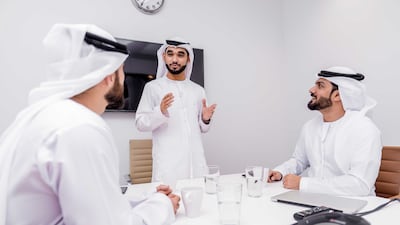The Middle East is on the cusp of a profound economic and cultural shift.
Family-owned businesses, which contribute about 60 per cent of the UAE’s gross domestic product, are preparing to transfer a staggering $1 trillion in assets to the next generation over the next decade in the region, according to accounting and auditing firm KPMG.
This wealth transfer is accompanied by a rise in women beneficiaries, signalling a significant evolution in both gender dynamics and financial planning.
In response, the financial sector is rapidly adapting to meet the unique needs and values of the next generation, one that is driving new financial trends with its forward-thinking approach.
Sustainability and ESG investing
Sustainability has become a defining characteristic of next-generation investors in the Middle East.
The younger generation demonstrates a strong commitment to tackling climate change and supporting environmental, social and governance (ESG) principles in their investment strategies, according to research by PwC.
Approximately 64 per cent of Middle Eastern next-generation leaders believe their family businesses have a responsibility to combat climate change, significantly higher than their predecessors, PwC found.
This mindset shift is not just related to financial returns but also to making a positive social and environmental impact.
Younger investors are increasingly aligning their wealth with the United Nations’ Sustainable Development Goals, with 60 per cent either actively supporting or planning to contribute to these global initiatives, PwC research found.
Additionally, millennials and Gen Z are leading the way in demanding investments that reflect their concerns about climate change.
According to a Knight Frank report this year, 66 per cent of millennials in the region prioritise purpose-driven investments, increasing demand for green bonds and ESG funds.
The rise of alternative investments
A distinguishing feature of next-generation investors in the GCC is their preference for alternative assets over traditional stocks and bonds.
The region’s younger investors, armed with financial literacy and supported by government initiatives, are more willing to take calculated risks in emerging industries like private equity, venture capital and digital assets.
A recent study revealed that 17 per cent of their portfolios are allocated to alternative assets, compared to just 5 per cent for older generations, and this trend is set to grow, according to the 2024 Bank of America Private Bank Study of Wealthy Americans.
Venture capital, in particular, has captured the interest of younger investors, offering them the chance to contribute to the growth of sectors such as energy transition and renewables.
The appeal lies not only in potential high returns but also in the opportunity to align their financial goals with their values.
Women’s empowerment and influence
The continuing wealth transfer is also transforming gender dynamics in the region.
The UAE’s seventh ranking globally on the UN Gender Inequality Index in 2024 highlights the increasing role of women in business and finance.
As women in the Middle East control almost $1 trillion in wealth, according to the Boston Consulting Group, and as younger generations take on more leadership roles, their influence in wealth management is growing exponentially.
head of Middle East, EFG International
With women becoming beneficiaries of family wealth and playing more prominent roles in financial decision-making, they are not only shaping the future of wealth management but also driving the region towards greater gender equality in business.
The new face of wealth management
As the next generation takes the reins of family businesses and wealth, they are reshaping the financial landscape with their purpose-driven investment strategies and openness to alternative investments.
Their focus on sustainability, willingness to embrace risk and demand for impact investing are not only modernising wealth management but also setting new benchmarks for the industry across the Middle East.
With family offices increasingly led by the next generation, the financial sector is undergoing a significant transformation, pivoting towards innovation, inclusivity and long-term sustainability.
Francois Farjallah is head of Middle East at EFG International
